A Primeau signatory on the 1825 USA Treaty with the Ponca.
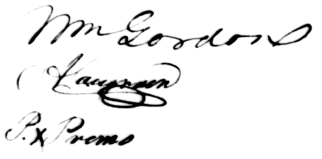 Of 22 witnesses to the signing of the june 1825 USA treaty with the Ponca tribe at White Paint Creek (now Bazile Creek in Knox County, northeast Nebraska, a tributary of the Missouri River, five miles east of Niobrara and five miles southwest of Santee), only three, at the very bottom, have no title ascribed to them: Wm. Gordon, A. Langman, P. x Promo. Presumably their relationship to the proceedings was unknown then and nobody has since ever attempted to find out the reason or roles for these names to be included. Of 22 witnesses to the signing of the june 1825 USA treaty with the Ponca tribe at White Paint Creek (now Bazile Creek in Knox County, northeast Nebraska, a tributary of the Missouri River, five miles east of Niobrara and five miles southwest of Santee), only three, at the very bottom, have no title ascribed to them: Wm. Gordon, A. Langman, P. x Promo. Presumably their relationship to the proceedings was unknown then and nobody has since ever attempted to find out the reason or roles for these names to be included.
The 21st name, Promo, is unusual because there's no record of a man named Promo along the Missouri River or its tributaries, like White Paint Creek, in the early 1800s. But there was a Primeau by the name of Pierre, a Ponca interpreter at the Yankton sub-agency in 1838.
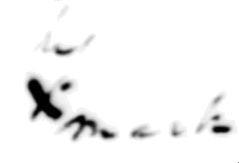 I requested a photocopy of the original document from the National Archives in Washington DC so i could check the actual cursive signature, and received it this past saturday. While i can easily see how a person might read the cursive as "P. X. Promo", i also see that the 'X' is not the same size or style or angle of the other handwriting, and should properly be interpreted as the 'X' of "his mark" -- the standard symbol and comment where a person who doesn't know how to write simply scratches the paper in the shape of an X as a symbol to acknowledge his name as written on the treaty, as seen on the right margin of the page for Ponca men, but not used for any of the American men. (Note that there is no period (.) -- signifying an abbreviation -- on the capital 'X' in Premo's handscript or typescript name.) I requested a photocopy of the original document from the National Archives in Washington DC so i could check the actual cursive signature, and received it this past saturday. While i can easily see how a person might read the cursive as "P. X. Promo", i also see that the 'X' is not the same size or style or angle of the other handwriting, and should properly be interpreted as the 'X' of "his mark" -- the standard symbol and comment where a person who doesn't know how to write simply scratches the paper in the shape of an X as a symbol to acknowledge his name as written on the treaty, as seen on the right margin of the page for Ponca men, but not used for any of the American men. (Note that there is no period (.) -- signifying an abbreviation -- on the capital 'X' in Premo's handscript or typescript name.)
The second 'o' is a connected loop - a perfect 'o'. But the first supposed 'o' is not closed on the top right, and should be translated, i believe, as an 'e'.
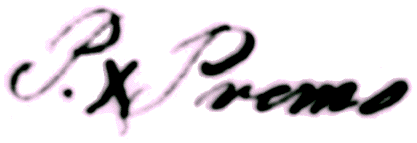
Thus the signature is rightly that of "P. Premo", as written by a second party on behalf of an illiterate first party, and signed with his mark, 'x'.
'P. Premo' is, i believe, Pierre Primeau, born in may 1770 at Châteauguay, Québec, Canada, older brother of Paul Charles.
If the name is truly Premo not Promo, there ought to be some other instances of
(a) the same person's name spelled the same way
(b) within the general time frame (±25 years) and
(c) within the same geographic area. And there are:
- in 1799 Paul and Pierre Primo (brothers) claim land in/near St Charles, Missouri;
- on 6 may 1812 Manuel Lisa hired Pierre Primeau as an engagé (fourure) going up the Missouri;
- Pierre Primeau was a boatman in 1833(?) on the upper Missouri on the steamboat Assiniboine, employed by the American Fur Company;
- in 1838 Pierre Primeau was a Ponca interpreter at the Yankton sub-agency [?]
Correcting "P. X. Promo" to "P. Premo", to refer to Pierre Primeau who had visited the area in 1812 and later served as a Ponca interpreter, is a logical conclusion that still needs further verification from primary sources. But it should be noted that other circumstantial evidence, including the fact that misspelling of signatures on official treaties is common; that the earlier 1817 US treaty with the Ponca was signed by persons familiar with Pierre Primeau, eg, Manuel Lisa; and the existence of a "half-breed" Ponca chief by the name of Lone Chief, also known as Antoine Primeaux (1877), and a head man White Feather, also known as Peter Primeaux (1880), both presumably descendants of a Primeau father who was active in the area at least 40 years earlier; and the births of Leon (b 1857 Elk Point, Dakota Territory, now Union County, South Dakota) and Mary Louise Primeau (b 1863 Sioux City, Iowa) on the other (east) side of the river from the Ponca treaty site.
P. Premo, signed in 1825 with an 'X', is the first proof of a Primeau with extended contact among Native Americans, and the first proof of Primeau contact with the Ponca. Now to find out how he - Pierre, Antoine and Peter are related. Then on to the Primeau among the Santee and/or Yankton.
;>
tom kunesh, a ggggnephew
15 september 2008, updated 18 october 2008
sources
National Archives/NARA, on www.footnote.com
Publication Number: M668
Publication Title: Ratified Indian Treaties, 1722-1869
Date Range: Aug. 24, 1818-Nov. 7, 1825
Treaty Number: 128
Description: Treaty with the Ponca and Pancar Village, June 9, 1825.
Page: 6
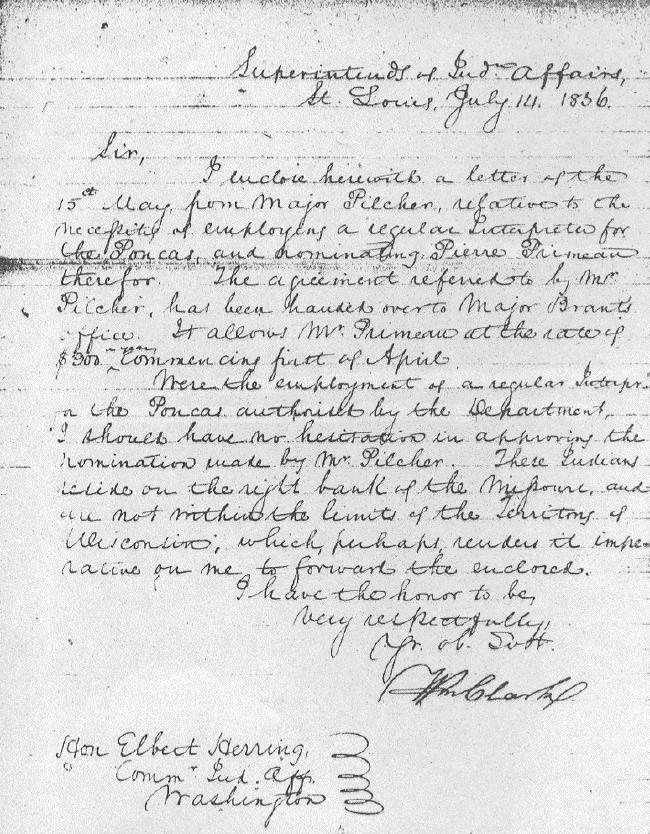
image courtesy of J Tibbetts 2008 |
|
Superintendy of Ind. Affairs,
St. Louis, July 14, 1836.
Sir,
I enclose herewith a letter of the
15th May, from Major Pilcher, relative to the
necessity of employing a regular Interpreter for
the Poncas, and nominating Pierre Primeau
therefor. The agreement referred to by M.
Pilcher, has been handed over to Major Brant's
office. It allows Mr. Primeau at the rate of
$900^a year^ commencing first of April.
Were the employment of a regular Interpr-
for the Poncas authorized by the Department,
I should have no hesitation in approving the
nomination made by Mr. Pilcher. These Indians
reside on the right bank of the Missouri, and
are not within the limits of the Territory of
Wisconsin, which perhaps renders it impe-
rative on me to forward the enclosed.
I have the honor to be,
Very respectfully,
Yr. ob. Svt.
Wm. Clark
Hon Elbert Herring, )
Comm. Ind. Aff. )
Washington )
|
|
- from: William Clark (1770-1838), Superintendent of Indian Affairs, St. Louis
employed Pierre's younger brother Paul in 1804 on the Corps of Discovery (Expedition) [tpk]
In 1822 was appointed Superintendent of Indian Affairs by President Monroe, a new position created by Congress after the factory system was abolished.[11] Clark remained in that capacity until his death, his title changed with the creation of the Office of Indian Affairs in 1824 and finally the Bureau of Indian Affairs in 1829, both within the War Department. en.wikipedia.org/wiki/William_Clark_(explorer)
- to: Elbert Herring (1777-1876), Commissioner of Indian Affairs, Washington DC
attorney from New York, "a Jackson man and a strong advocate of Indian removal", "did not bring any administrative expertise or knowldege of Indian affairs to the bureau". (Ronald N. Satz, American Indian Policy in the Jacksonian Era 156-7) In 1832 Congress established the position of Commissioner of Indian Affairs. Herring was appointed by President Jackson in July 1832 as the first commissioner of Indian affairs (1832-1836).
- re. Pierre Primeau (1770-?), engagé, interpreter, signatory/witness to the 1825 US treaty with the Ponca; older brother of Paul (engagé on the first leg of the Corps of Discovery/Expedition in 1804); presumed patriarch of the Ponca Primeaux family, including Antoine/Lone Chief, Robert/Big Elk, and Zazette, Standing Bear's wife.
- ref. Joshua Pilcher (1790-1843), Indian Agent, Upper Missouri (1834-
former trapper, trader (1827-30, 1831-37) and Indian agent, president of the Missouri Fur Company (1820-31), US superintendent for Indian affairs at St Louis (1838-41), successor to William Clark.
the military rank/title "Major" was an honorific used in reference to US Indian Agents which were ultimately under the jurisdiction of the US War Department.
It wasn't until Joshua accepted an appointment as a sub-agent, that he lived in one location for more than a few months. During this period of time between spring of 1833 and 1835, Joshua seldom left the Council Bluffs area and took a wife - possibly Cabanné's former "servant woman" who was the half-blood daughter of a french trader named Michel Barada and an Omaha woman. In early 1834 she gave birth to a son, John Pilcher, and died not long after of cholera. Joshua showed little concern for the child and he was taken and raised by Big Elk [aka Robert Primeaux], an Omaha chief. The Omaha tribe raised him, but he kept his family name of Pilcher and grew up on the Omaha reservation in eastern Nebraska. He married Harriet Arlington, fathered ten children, and when he died in January 1898 near Walthill, Nebraska, had left dozens of descendants bearing the Pilcher name.
- freepages.genealogy.rootsweb.ancestry.com/~sunnyann/joshua.html
- ref. Ponca - originally a branch of the Maha or Omaha, the Southern Dakota, they resided on the Red River of the North where they had been attacked by the Sioux, and thereafter removed to the opposite side of the Missouri. There they built a village on the Ponca River. In 1835 while Joshua Pilcher was sub-agent for a portion of the Sioux on the Upper Missouri, a small band of Poncas (who had formerly lived under John Dougherty's agency on the mouth of the Niobrara River) were transferred to Joshua's jurisdiction, which at this time they were being attacked and killed by the Pawnees. In 1837 Joshua Pilcher was nominated by President VanBuren as Indian agent to the Sioux, Cheyenne, and Ponca Indians. freepages.history.rootsweb.ancestry.com/~earlystlouis/indiantribes.html
see also Joshua Pilcher, A Fur Trader and Indian Agent by John E. Sunder.
freepages.genealogy.rootsweb.ancestry.com/~sunnyann/joshua.html
- ref. Major Joshua B. Brant, Quartermaster, United States Army, St Louis 1832-1838
Following from pages 65-66, "Man Made Mobile: Early Saddles of Western North America", James Hutchins, in Smithsonian Studies in History and Technology, 1980.
- Letter from Thornton Grimsley to Major Joshua B. Brant, Quartermaster, United States Army, proposing to furnish saddles for the First Regiment, United States Dragoons, 1833 www.militaryhorse.org/features/1833letters.php
see also List of Officers of the Army of the United States from 1779 to 1900, William Henry Powell
- Yr. ob. Svt. = Your obedient Servant
|
"Primeau" in the Lewis and Clark Journals - University of Nebraska at Lincoln
Primeau, Paul [4 docs]
* November 6, 1804 [3x]
* July 4, 1804 [2x]
* Weather, November 1804 [2x]
* May 26, 1804 [1x]
http://lewisandclarkjournals.unl.edu/namesindex/index.php?name=Bazile%20(White%20Paint)%20Creek
Bazile (White Paint) Creek [3 docs]
* September 4, 1804 [4x]
* Part 1: Affluents of the Missouri River [3x]
* Part 1: Estimated Distances [2x]
White Paint Creek Bazile Creek, Knox County, Nebraska (see
entry for September 4, 1804)
Quiccurre or Rappid River Niobrara River, Knox County, Nebraska
Poncar River Ponca Creek, Knox County, Nebraska
Qui Carre river :: river That Runs
Qui courre (rapid)
http://digital.library.okstate.edu/kappler/Vol2/treaties/pon0225.htm
Bourgeois - Voyageur term for the Wintering Partners or Clerks. The word came from the French and described a "new middle class people" in Europe. Bourgeois were usually educated men of various nationalities. Many were Scottish, French or American. Clerks were almost always French until the end when more Americans and English held Clerk positions. - www.whiteoak.org/learning/language.htm
(www.google.com/search?q=%22p.+x.+promo%22+ponca)
other Primeau treaty signatories
Unratified Agreement of 1883
The provisions of the treaty of 1868, and the agreement of 1876, except as herein modified .....
Joseph Primeau. Seal.
Leon Primeau. Seal.
Witness our hands and seals at Standing Rock Agency, Dakota, this 30th day of November, 1882.
Charles Primeau, Interpreter.
Joseph Primeau, Interpreter.
Paul Primeau (Primo, Premo) married Pelagie Bissonet In 1799, age 23. He went on the first leg of the Lewis & Clark expedition in 1804, age 28. Paul & Pelagie had four sons that carried the Primeau surname up and around the Missouri River: Paul (b&d 1801), Joseph Emilien (b 1803, d 1836), Paul (b 1811, w/girl twin), Charles (b 1814), and Louis (b 1817).
The 9 June 1825 Treaty with The Ponca (Ratified Indian Treaty #128) has been microfilmed as part of National Archives Microfilm Publication M668 ("Ratified Indian Treaties, 1722-1869") and appears on Roll 5 of the publication.
TREATY WITH THE OTO, 1817.
June 24, 1817.
Witnesses present:
Lewis Bissell, acting secretary,
Manuel Lisa, United States Indian agent.
Benjamin O'Fallon, United States Indian agent,
W. Suigely,
Geo. G. Taylor,
W. Tharp,
Michl. E. Immell,
P. J. Nalsisor,
Sam. Solomon, interpreter,
Stephen Julien, United States Indian interpreter,
Gabriel S. Chouteau, second lieutenant, M. M.,
Joseph Lafleche, interpreter, his x mark.
----
TREATY WITH THE PONCA, 1817.
June 25, 1817 |
Witnesses present:
Lewis Bissel, acting secretary to the commissioners,
Manual Liea, United States Indian agent,
Benja O'Fallon, United States Indian agent,
R, Graham, Indian agent for Illinois,
Dr. Wm, J. Clarke,
B. Vasques,
Saml. Solomon, interpreter,
Stephen Julien, United States Indian interpreter,
Joseph Lafleche, interpreter.
----
1890 CENSUS : Nebraska : Santee Sioux : Santee Sioux Agency, Nebraska
. 403 295 Asdohewin Jane Premioux? mother f 44
. 404 296 . Lulu Premioux? daughter f 19
. 405 297 . Mary Webster daughter f 17
. 406 298 . Josephine Webster daughter f 12
. 407 299 . Silas Webster son m 2
Ponca chiefs named Primeau | Primeau locale 1825-1863
|
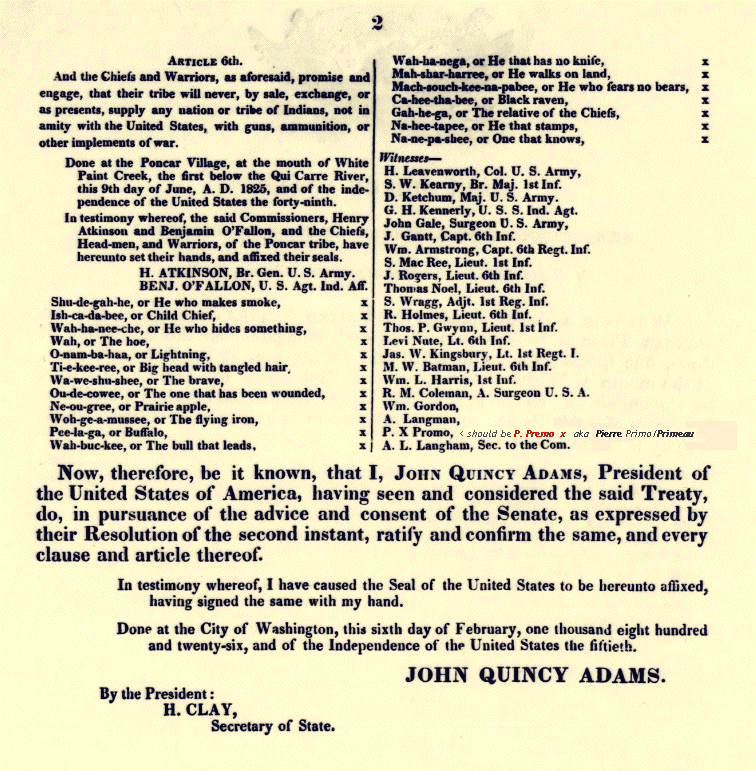
 Of 22 witnesses to the signing of the june 1825 USA treaty with the
Of 22 witnesses to the signing of the june 1825 USA treaty with the  I requested a photocopy of the original document from the National Archives in Washington DC so i could check the actual cursive signature, and received it this past saturday. While i can easily see how a person might read the cursive as "P. X. Promo", i also see that the 'X' is not the same size or style or angle of the other handwriting, and should properly be interpreted as the 'X' of "his mark" -- the standard symbol and comment where a person who doesn't know how to write simply scratches the paper in the shape of an X as a symbol to acknowledge his name as written on the treaty, as seen on the right margin of the page for Ponca men, but not used for any of the American men. (Note that there is no period (.) -- signifying an abbreviation -- on the capital 'X' in Premo's handscript or typescript name.)
I requested a photocopy of the original document from the National Archives in Washington DC so i could check the actual cursive signature, and received it this past saturday. While i can easily see how a person might read the cursive as "P. X. Promo", i also see that the 'X' is not the same size or style or angle of the other handwriting, and should properly be interpreted as the 'X' of "his mark" -- the standard symbol and comment where a person who doesn't know how to write simply scratches the paper in the shape of an X as a symbol to acknowledge his name as written on the treaty, as seen on the right margin of the page for Ponca men, but not used for any of the American men. (Note that there is no period (.) -- signifying an abbreviation -- on the capital 'X' in Premo's handscript or typescript name.)
